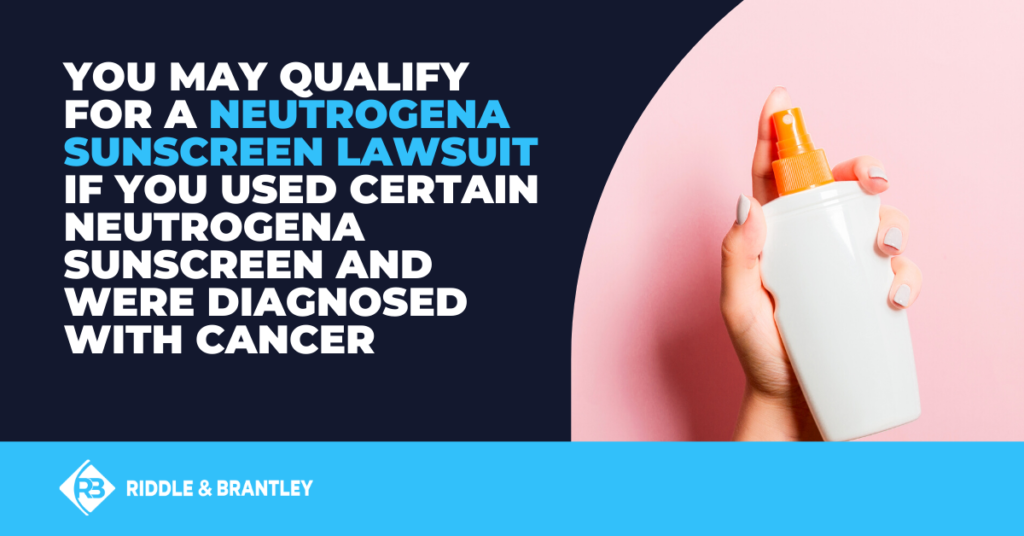Neutrogena Sunscreen Cancer Link Claims Are Under Investigation
Our firm is actively investigating claims that certain Neutrogena sunscreens cause cancer, including leukemia, chronic lymphocytic leukemia (CLL), non-Hodgkins lymphoma, and multiple myeloma, among others. Riddle & Brantley is committed to fighting for justice for deserving victims in benzene sunscreen lawsuits.
HEADS UP: In July 2021, Johnson & Johnson issued a sunscreen recall of certain Neutrogena and Aveeno sunscreen products, acknowledging that the presence of benzene in these sunscreens may increase the risk of cancer. Click the link above for more information on the recall, or visit Johnson & Johnson's sunscreen recall announcement page.
Neutrogena Sunscreen Lawsuits Consolidated in MDL
In October 2021, Neutrogena sunscreen lawsuits — along with other benzene lawsuits concerning other brands like Aveeno — were consolidated in multidistrict litigation (MDL) in the Southern District of Florida. This is an important step forward for plaintiffs, and means that costs associated with evidence discovery will be shared and the legal process will be streamlined into key "bellwether" trials that will be used to weigh evidence. Bellwether trials typically influence potential settlements (though no Neutrogena sunscreen lawsuits have been settled to date and there are no guarantees). Johnson & Johnson, the manufacturer of Neutrogena sunscreen, strongly denies any allegations of negligence or wrongdoing.
"Do I Qualify for a Neutrogena Sunscreen Lawsuit?"
You may qualify for a Neutrogena sunscreen (or another brand of sunscreen) cancer lawsuit if you meet the following criteria:
- Must have used a qualifying sunscreen or after-sun care product, including:
- Neutrogena Ultra-Sheer Weightless, SPF 100+
- Neutrogena Ultra-Sheer Weightless, SPF 70
- Neutrogena Beach Defense Oil-Free Body Spray, SPF 100
- Neutrogena Beach Defense Body Spray, SPF 50
- Neutrogena Invisible Daily Defense Body Sunscreen Broad Spectrum, SPF 60+
- Sun Bum Cool Down Gel
- Aveeno Protect & Refresh Spray
- CVS Health After-Sun Aloe Vera Soothing Spray
- Fruit of the Earth Aloe Vera Gel
- Must have used the qualifying sunscreen or after-sun care product regularly (at least a full year, 3-4 times per week)
- Must have been diagnosed with one of the following conditions:
- Acute Myeloid Leukemia (AML)
- Acute Lymphocytic Leukemia (ALL)
- Chronic Lymphocytic Leukemia (CLL)
- Myelodysplastic Syndrome (MDS)
- Non-Hodgkin Lymphoma
- Multiple Myeloma
- Aplastic Anemia

For a FREE consultation with an experienced Neutrogena sunscreen lawsuit attorney, please call 1-800-525-7111 or complete the fast and easy form below.
The consultation is free and you won't pay any attorney fees unless we win your case and you receive compensation for injuries suffered potentially due to benzene-containing sunscreen. Remember, we don't get paid unless you do — if we don't recover compensation for you in your Neutrogena sunscreen lawsuit, you won't pay any attorney fees.
Call 1-800-525-7111 and let's review your Neutrogena sunscreen cancer claim today. The longer you wait, the harder it may be to prove your claim and recover the compensation you need and deserve.
Based on available evidence, claims against Neutrogena sunscreens are considered especially strong, as are alleged Aveeno sunscreen cancer claims. However, certain other brands of sunscreen may qualify for a sunscreen lawsuit, as well.
"Does Neutrogena Sunscreen Cause Cancer?"
Certain Neutrogena sunscreens (as well as other brands of sunscreen) have been found to contain benzene, a known cancer-causing chemical. Johnson & Johnson and other manufacturers maintain that the presence of benzene is unintentional, and all defendant(s) have denied allegations of negligence and/or wrongdoing.
In its statement announcing the Neutrogena sunscreen recall (also affecting Aveeno products), Johnson & Johnson said that benzene “could potentially cause cancer depending on the level and extent of exposure.”
The International Agency for Research on Cancer (IARC), part of the World Health Organization (WHO), classifies benzene as a carcinogen, meaning that it can cause cancer. IARC notes that benzene (as found in certain Neutrogena and other sunscreens) has been linked to acute lymphocytic leukemia (ALL), chronic lymphocytic leukemia (CLL), multiple myeloma, and non-Hodgkin lymphoma.
Many other scientific organizations and government agencies have also designated benzene as a human carcinogen, including the National Toxicology Program (NTP) of the National Institutes of Health (NIH), the Centers for Disease Control & Prevention (CDC), and the Food & Drug Administration (FDA).
To be clear, benzene in Neutrogena sunscreen (and other sunscreen brands) may represent a clear and present danger, and can potentially cause cancer.
How to File a Neutrogena Sunscreen Lawsuit
If you've suffered from a qualifying cancer (listed above) after using a Neutrogena sunscreen (also listed above), or another qualifying brand of sunscreen like Aveeno, you may be entitled to compensation in a Neutrogena sunscreen lawsuit.
For a FREE, no-obligation consultation with a Neutrogena lawsuit attorney at Riddle & Brantley, call 1-800-525-7111 or complete the fast and easy form below.
"This settlement changed me and my family's lives."
-Linda B., Riddle & Brantley client
There are no upfront costs and no attorney fees unless we win your case and you receive compensation. Call 1-800-525-7111 and let's review your Neutrogena sunscreen cancer claim.
Justice Counts.
*** Disclaimer: The results mentioned are intended to illustrate the type of cases handled by the firm. These results do not guarantee a similar outcome, and they should not be construed to constitute a promise or guarantee of a particular result in any particular case. Every case is different, and the outcome of any case depends upon a variety of factors unique to that case.